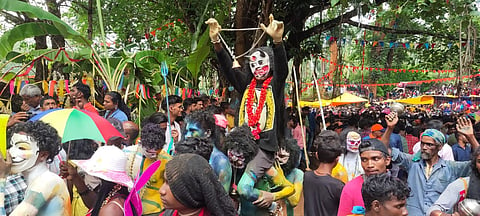

MADIKERI: It was a vibrant and eccentric day out for the tribal communities of Kodagu as the unique ‘Bodu Namme’ celebrations concluded on a grand note. Tribes from across the district, and a few from neighbouring regions, gathered at the Devarapura Aiyappa Temple to offer prayers, unlike any other, in the form of abuses directed at the deity.
Dressed in eccentric costumes, hundreds of tribal devotees marched through the streets before reaching Devarapura.
Demons, gods, public figures, mythological characters, disco dancers, and figures smeared in mud and ash, it resembled a chaotic yet enthralling fashion parade of tribal creativity.
The rhythmic beats of their improvised instruments, crafted from plastic bottles and drums, echoed through the village as they hurled verbal tirades at the deity, seeking divine blessings for their community’s welfare.
“This is a unique festival of the tribal community in the district. Goddess Bhadrakali and Lord Aiyappa are hurled abuses at by the tribal devotees and they believe that the deities bless the villagers. They dress up in various weird costumes, hurl abuses to the god, and this is a form of ex-voto offering to the deity,” shared Bopanna, a resident of Thithimathi.
While most of the tribal participants are daily wage labourers working in plantations and estates, they take two days off work to participate in the celebration. During this ‘Bedu Habba’, the tribes are accorded special and equal status in society.
“While majority of the times that tribes face exploitation, the two days of the festivity extend them complete freedom to hurl abuses and show their anguish. This ritual has been practised from ancestral times and it is respected by all the communities in the district,” he added.
Over these two days, tribal members momentarily put aside their struggles and challenges, uniting in their tradition of hurling abuses as an act of worship to their indigenous deities.